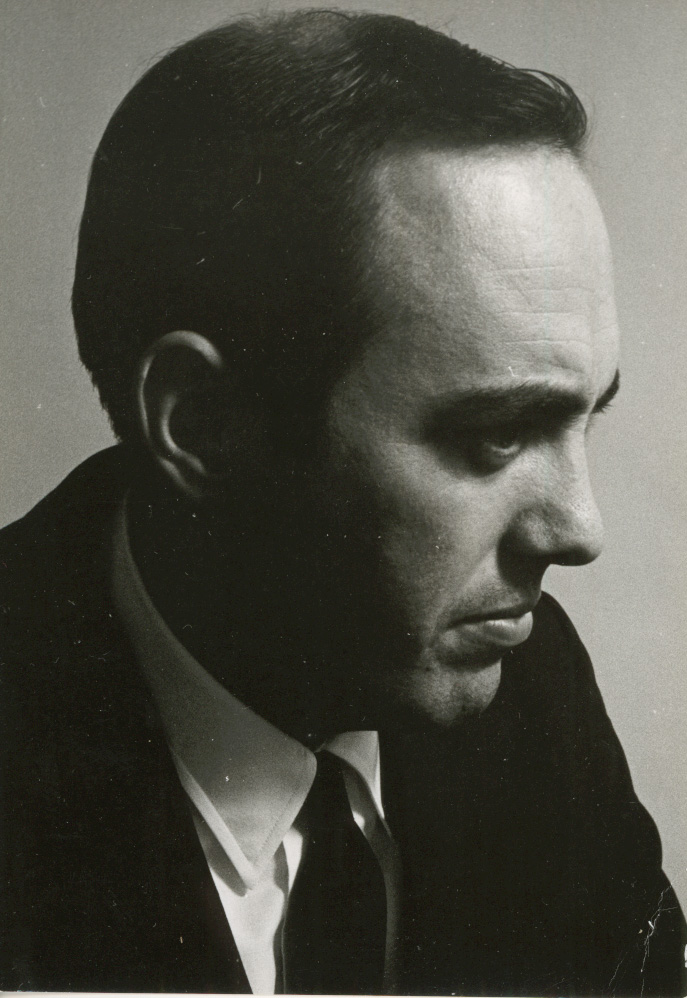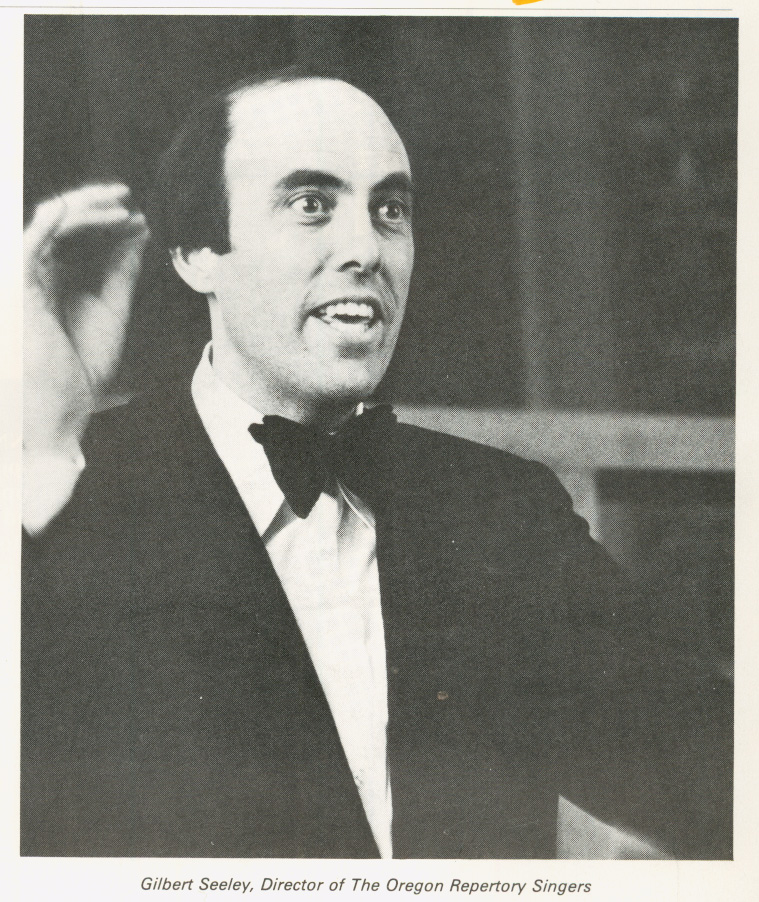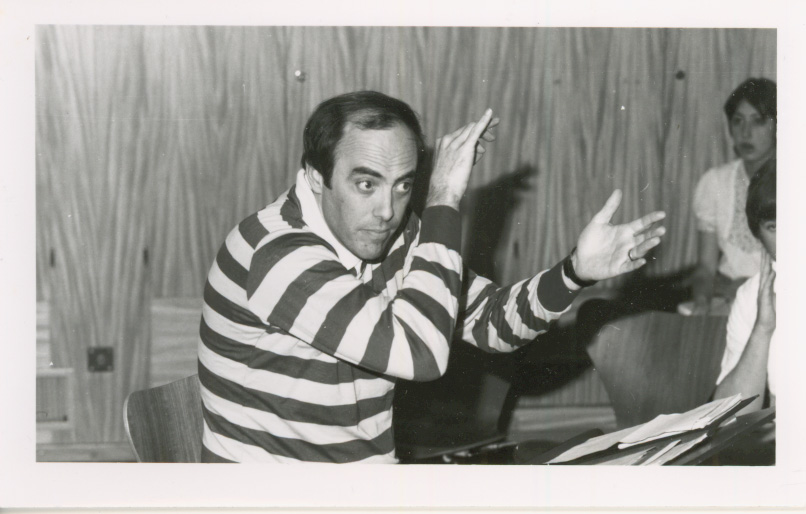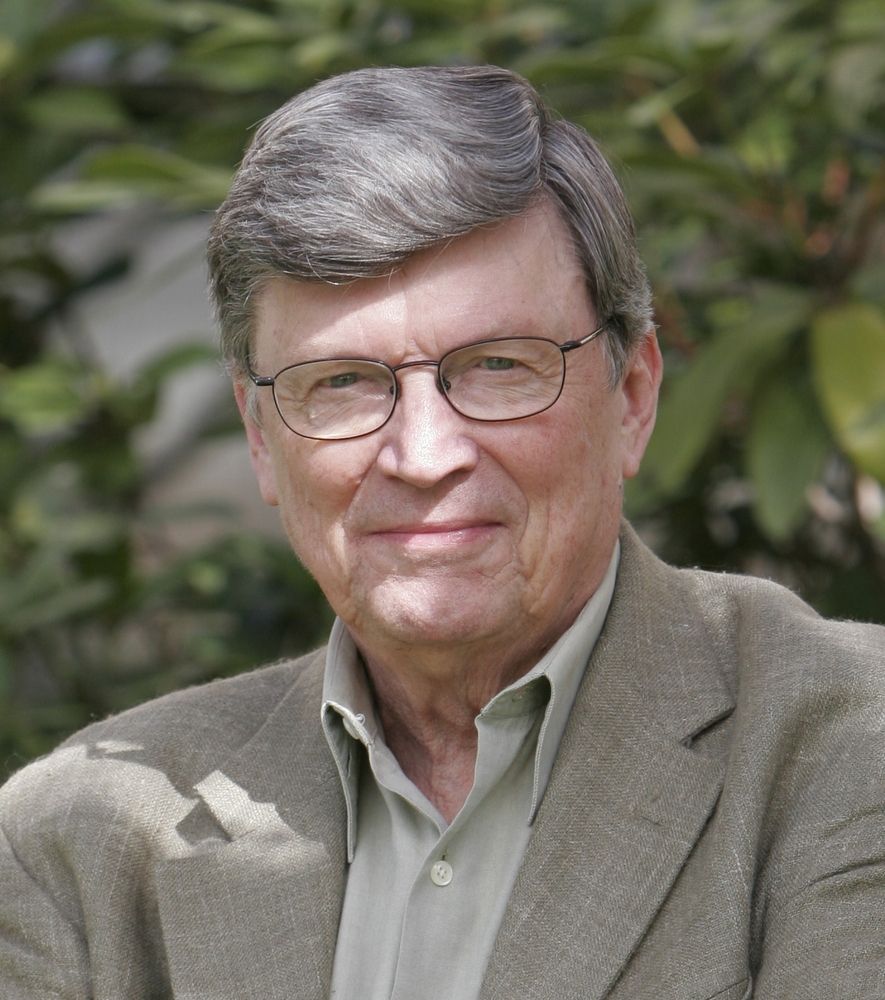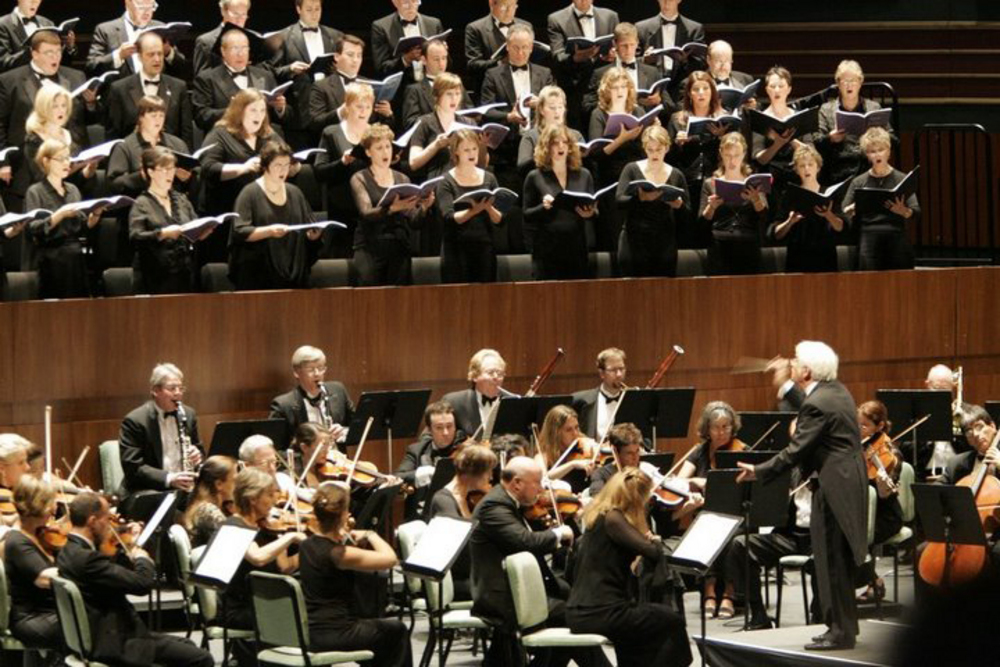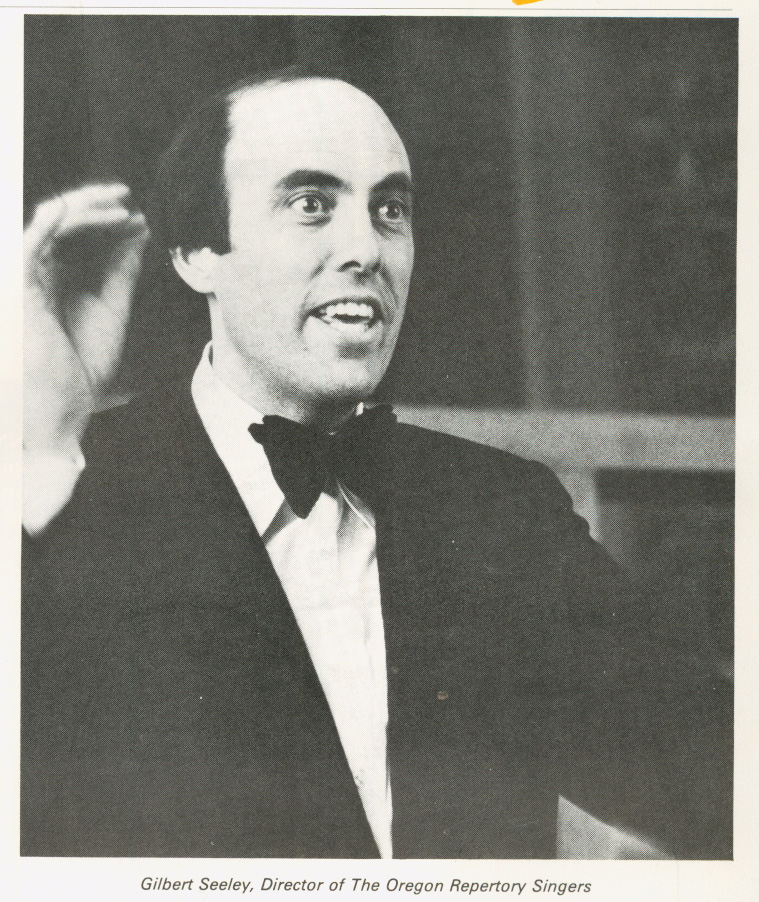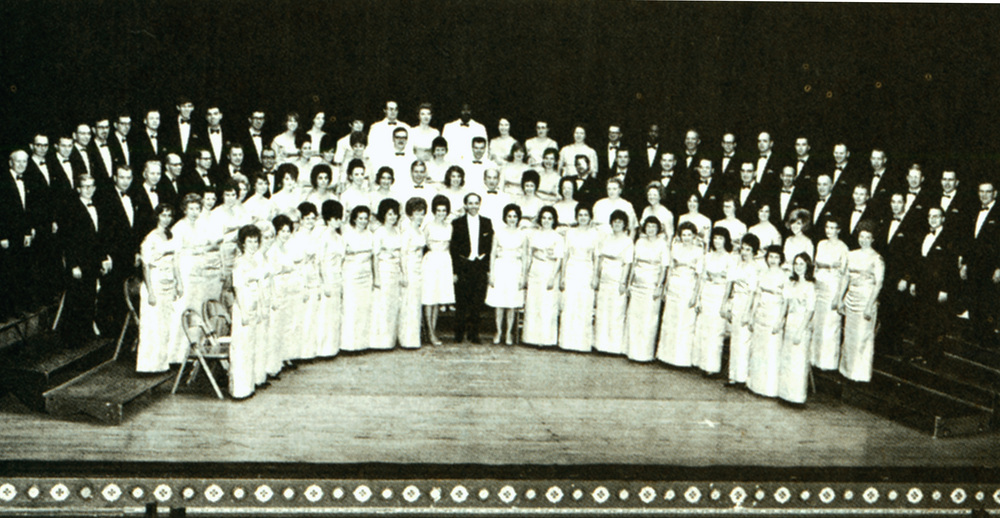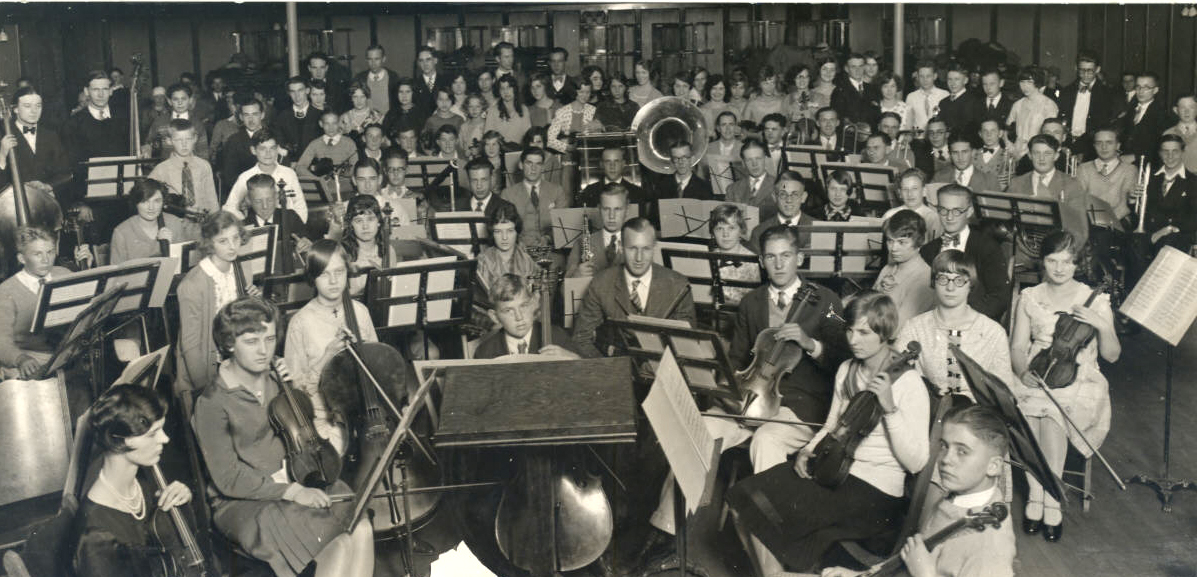The presentation of choral music in Oregon changed when Gilbert Stewart Seeley arrived in 1975. “He has established a new standard of excellence in this region,” wrote Jacob Avshalomov, director of the Portland Youth Philharmonic. Oregonian music critic David Stabler agreed, praising Seeley's “unsurpassed interpretation.” Karen Kammerer of the Eugene Register-Guard wrote: "Known throughout the choral world for his extensive knowledge of choral literature, [Seeley] focuses on crossing cultural and international borders.”
Seeley was born the youngest of three sons to Ralph and Ethel Stewart Seeley on June 9, 1938, in Evanston, Illinois. He attended school in Paw Paw, a suburb of Kalamazoo, Michigan. At Western State High School, he played tennis and was on the all-state basketball team. He learned to love music from his organist and piano-teacher mother. While in high school, he won a national music competition in French horn, which allowed him to attend Interlochen Arts Camp in northern Michigan, where he joined the choir and performed as a soloist.
In 1956, Seeley attended Wesleyan University before transferring to Oberlin Conservatory in 1958, where he studied voice with Robert Fountain, the dean and director of singing and choral activities. He spent a year in 1959–1960 at Mozarteum Academy of Music in Salzburg, Austria, and graduated from Oberlin with a Bachelor of Music degree in 1961. From 1961 to 1969, he studied at the University of Southern California, where he earned Master of Music and Doctor of Musical Arts degrees, with a dissertation on German choral music. One of his classmates was Royce Saltzman, the originator and executive director of the Oregon Bach Festival; his principal teachers were Charles Hirt and Ingolf Dahl, world-famous choral conductor and composer.
While in California, Seeley taught at the University of California, Santa Cruz (1967–1969) and was the director of music at a number of churches. He assisted composer and conductor Carlos Chavez as director of the Cabrillo Music Summer Festival chorus in 1967–1970 and was director of choral music at the innovative California Institute of Arts in Valencia in 1970–1975. During the same years, he was assistant director of the Aspen Choral Institute, preparing choirs for conductor Helmuth Rilling, the artistic director of the Oregon Bach Festival, and directing the Aspen Chamber Choir.
In 1975, Seeley was named associate professor of music at Lewis & Clark College in Portland, where he was responsible for all choral activities. He taught conducting, music history, contemporary music, and a large class on world music. As a result, the college, according to James Bash, “has become...a focal point for world music in the Pacific Northwest.” Seeley took the college choir on European tours in 1977 and 1982, led two terms in the college overseas program in Strasbourg, France, and was honored with the James Rogers Endowed Chair in Music in 1992. He retired in 2007.
Seeley was the artistic director and conductor of the Oregon Repertory Singers from 1976 to 2011. His guest conducting included Roseburg, Lakeridge, Jefferson, and Lincoln High School choirs; All-state High School and Coast Valley League choral festivals; Eugene Symphony; Chamber Music Northwest; Portland Gay Men’s Chorus; Portland Symphonic Choir; Portland Baroque Orchestra; Portland Youth Philharmonic; Oregon Bach Festival; Oregon Ballet; Oregon Symphony; the orchestra and RainShadow Chorale of Port Townsend, Washington. In 2006, he was invited to guest conduct the Moscow Chamber Choir in a program of all-American music, including his original work, “Homage to Nelson Mandela.”
His recordings include the world premiere recordings of Berliner Messe, by Arvo Pärt; Mass to St. Anthony, by Lou Harrison; Rachmaninov’s Vespers (with guest conductor Vladimir Minin); a Christmas CD; and the Sacred Music of Duke Ellington with the Seattle Repertory Jazz Orchestra and the Oregon Repertory Singers. He also recorded works by John Corigliano, Stephen Paulus, Cecil Effinger, Samuel Barber, Libby Larsen.
Seeley received the Lewis & Clark College Community Treasure Award in 1999, the Aaron Copland Award for performing American music in 2002, and the Oregon Governor’s Arts Award in 2007. He and his wife Jane Kepner spent several winters in Tucson, Arizona, where he taught world music at the Jewish Community Center.
-
![]()
Gilbert Seeley, The California Institute of the Arts, 1971.
Courtesy Gilbert Seeley
-
![Gilbert Seeley conducting the Oregon Repertory Singers, 1984.]()
Seeley, OR Rep Singers, 1984.
Gilbert Seeley conducting the Oregon Repertory Singers, 1984. Courtesy Gilbert Seeley
-
![]()
Gilbert Seeley Conducting the Lewis and Clark College Choir, 1984.
Courtesy Gilbert Seeley
-
![Director of Choral Activities, Lewis & Clark College, 1975-2002.]()
Gilbert Seeley, 2002.
Director of Choral Activities, Lewis & Clark College, 1975-2002. Courtesy Gilbert Seeley
Related Entries
-
H. Royce Saltzman (1928-2023)
Vocalist and conductor Royce Saltzman was the cofounder and longtime ex…
-
![Oregon Bach Festival]()
Oregon Bach Festival
In the summer of 1970, two young choral conductors—one from Stuttgart, …
-
![Oregon Repertory Singers]()
Oregon Repertory Singers
Since 1974, no other choral organization has brought more recognition o…
-
![Portland Symphonic Choir]()
Portland Symphonic Choir
Struck by Portland's lack of a civic chorus, C. Robert Zimmerman decide…
-
![Portland Youth Philharmonic]()
Portland Youth Philharmonic
Established in 1924, the Portland Youth Philharmonic is the oldest yout…
Map This on the Oregon History WayFinder
The Oregon History Wayfinder is an interactive map that identifies significant places, people, and events in Oregon history.
Further Reading
"Oregon Symphony Orchestra." Encore: Arts in Performance Magazine 14:1 (Sept. 23, 1984), 45-47.
Bash, James. "Behind the Baton: Gil Seeley." Sforzando (June 1996), 10-11.

